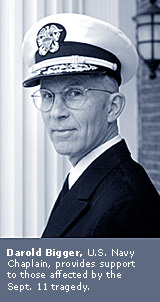

Campus Currents 
On the Scene September 11
The sound of the low-flying plane brought Darold Bigger out of his Washington, D.C., office. Bigger, a professor of religion and social work and also a navy chaplain, was completing a term of service and had planned to return home to Walla Walla in time for the start of fall quarter.
He spoke with a co-worker about the plane breaking the sound barrier, but the co-worker thought the boom was “probably one of those big dumpsters.” Bigger went back to his office at the Navy Annex, about half a mile from the Pentagon. Earlier that Sept. 11 morning, Bigger had gathered with others in the Chief of Chaplain’s office to watch CNN in shock as the World Trade Center was destroyed. A few minutes later the alarms went off at the Navy Annex, and the building was evacuated.
From the parking lot where everyone gathered, Bigger could see what had happened to the Pentagon. Along with many from his building, he went immediately to help. As a rear admiral and the Deputy Chief of Chaplains for Total Force, Bigger coordinated the work of the chaplains for the next 36 hours at the site, while medical teams set up triage locations and emergency workers looked for survivors.
Bigger recalls visiting with a man in civilian clothes who had
a brother working right in the part of the Pentagon that was hit. “He
came down there and was standing watch on behalf of his brother,” he
says.
That first day Bigger also visited with another man and asked what brought
him there. “He said, ‘My wife worked in that office right there,’
and he pointed to the hole in the wall. He said, ‘I’ve decided that
this is the best place I can be and this is the best thing I could be doing.’
He was there that first day doing anything he could to help people—bringing
clothes, food and water. It was an amazing way for him to cope with his loss,”
Bigger says.
Bigger accompanied two Naval officers to notify a family that their daughter was missing and later returned when she was considered to be deceased. “One of the officers had made phone contact with the family and they said they did not want us to come, but it was the Chief of Naval Operations’ mandate that everyone be contacted face to face. When we got there an aunt of the woman who was killed met us in the driveway. As I got out of the car she saw the cross on my collar and pointed at me and said, ‘I blame God for this. I don’t want to talk to you.’ She turned and walked away,” he says.
Bigger and the two officers went in the house and talked with the family. It was tense and difficult for a while, but they listened to the family’s anger and grief and then shared some of their own experiences with loss. Bigger told the family about his daughter Shannon who was a homicide victim in Washington, D.C. He says that the family softened. “It’s a matter of being open to sharing their grief and letting them vent in whatever way they need,” he says.
While visiting New York City a week and a half later, Bigger says he experienced an emotional turning point. He accompanied the Secretary of Transportation and the Commandant of the Coast Guard to Ground Zero. “The sheer size of it is really overwhelming. Seeing the emergency workers with blank stares on their faces brought some of the impact home,” he says. Bigger attended the memorial service at Yankee Stadium and recalls, “It was emotionally touching for me to stand in that stadium and hold hands with everyone and sing ‘We Shall Overcome,’” he says.
A statement by the Coordinating Rabbi of New York City has stayed with him: “This day 6,000 people did not die. One person died and it happened 6,000 times.”
“The cumulative impact of that hit me in New York,” Bigger says. “It wasn’t just one disaster. It was 6,000 disasters.” He also visited the Wall of Prayer at Bellevue Hospital where people have posted pictures and notes. “That also broke it down into one person at a time and it was overwhelming,” Bigger says.
Bigger and his wife, Barbara, have talked about how they are coping with the Sept. 11 tragedy. Because of the loss of their daughter Shannon, Bigger says, “We have already faced the question of, ‘Where was God when this terrible thing happened to someone I love?’ We’ve already faced the need to live in a world that we can’t pretend is safe anymore. We’ve already faced the need to go on with life in spite of disappointments and sadness. Disasters can come at any moment for any individual. Being ready for that is all we can do.”
To individuals who desire to help those who have suffered such a great loss Bigger says, “The prayers of others have been great encouragement. It’s not idle comment to say that praying on behalf of others is a help. It has been a significant reassurance to those who have been in the heat of things here as well as spiritual help that they may not even be aware of.” W
Previous Story | Next Story | Back to Contents